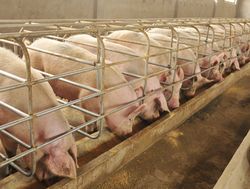Feed innovations offer more efficient, ecological meat production
Bioactive substances such as essential oils and spices all have potential beneficial effects on gut function. By combining these bioactive substances with enzymes, the EU-funded ECO FCE project has developed feed that can have beneficial effects on pigs and chickens and help farmers achieve cost efficiencies. This could make a significant impact on farm budgets as feeding accounts for around 70 % of animal production costs. The ECO FCE scientists found that improved feed conversion efficiency (FCE) of farm animals could be achieved in pigs by adding enzymes that specifically target galactosides in feed materials. The team also found that phosphorus has a positive effect on bone mineralisation. These results were presented at an industry workshop during the Annual EAAP (European Federation of Animal Science) Conference in Warsaw, Poland in August 2015. In addition, the project has shown that phytogenic feed additives – non-antibiotic growth promoters derived from herbs and spices – can improve nutrient digestibility while at the same time reduce the formation of noxious and greenhouse gases like ammonia and methane. This could have significant long term implications in helping agriculture meet the growing need for more environmentally friendly meat production. While intensive production will continue play a key role in feeding a growing global population, it must be made sustainable. The ECO FCE project team is confident that further potential lies in combining feed enzymes with active plant ingredients because different combinations can have different synergistic effects. A number of further feeding studies with pigs and broiler chickens are therefore planned using different combinations. A particular emphasis will be placed on evaluating the effects of adding enzymes and bioactive substances to lower quality diets. The project has also genotyped around 1 000 animals in each of the two species, to help correlate results and improve the selection of breeding stock with superior feed use efficiency. Initial results from this exercise indicate the existence of a number of genetic markers which may be of use. In addition, the project has carried out a major search of literature in order to create an ECO-FCE electronic database of information on dietary, genetic and gut factors affecting FCE in pigs and broiler chickens. As part of this literature reviewing process, a horizon-scanning exercise was carried out, which revealed some interesting findings. For example, researchers found that a derivative of Stevia has been shown to improve the daily gain, feed intake and feed use efficiency of pigs, and that as the dose increased, so too did the performance of the pigs. Furthermore, broilers offered a diet with Capsicum frutescens (chilli) demonstrated improved performance and that final body weight was significantly increased. The horizon-scanning report will be made available on the ECO FCE website. The project, which started in 2013, is due for completion in 2017. The final results will further contribute to improving industry knowledge on how to optimise feeding strategies for pigs and broiler chickens and minimise agriculture’s ecological footprint. For further information please visit: ECO FCE project website
Countries
United Kingdom



